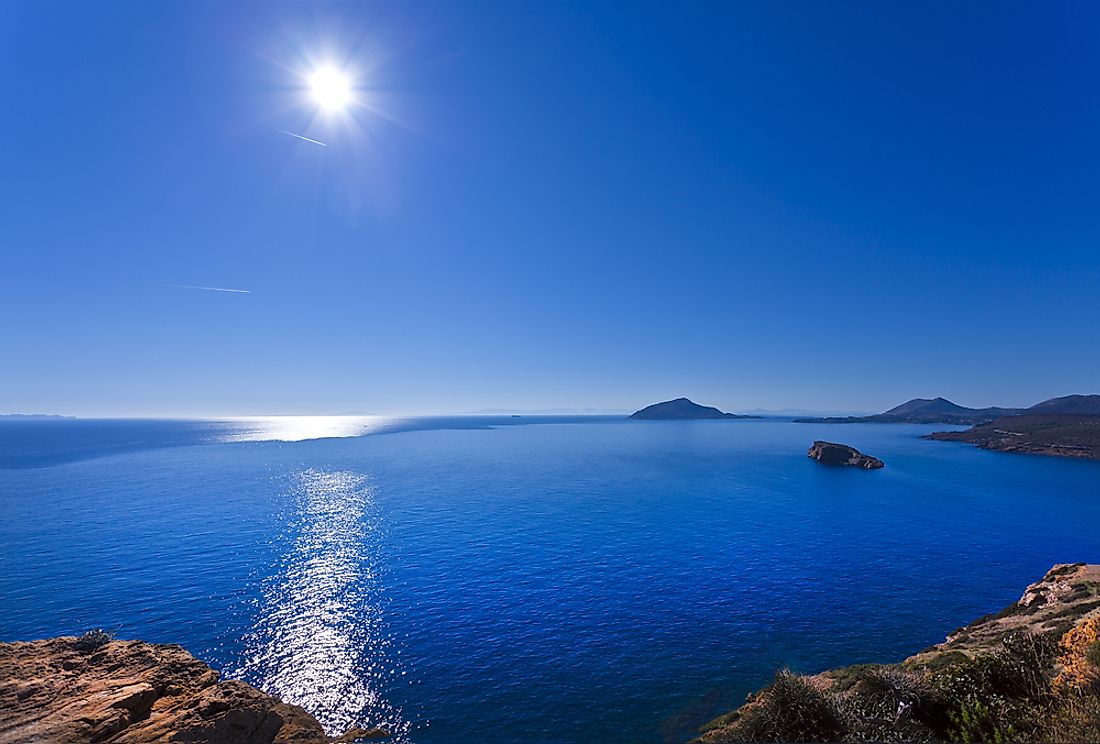Which Countries Have A Coastline On The Aegean Sea?

The Aegean Sea is an important historic and economic body of water located between the nations of Turkey and Greece. Essentially, the Aegean Sea is a long bay which juts northward off of the Mediterranean Sea. Spanning an area of 83,000 square miles, the sea reaches a maximum width of 250 miles and a length of 430 miles. At its deepest point east of the island of Crete, the Aegean reaches a depth of 11,627 feet. Traditionally called the Archipelago, the Aegean is connected to numerous waterways including the straits of Bosphorus and Dardanelles as well as the Black Sea and the Sea of Marmara. Turkey and Greece are the only two countries to have a coastline on the Aegean Sea.
Turkey
Officially known as the Republic of Turkey, this nation which occupies some 302,455 square miles, is home to an estimated population of 80,810,525 residents from various ethnic backgrounds including Turks, Arabs, Kurds, and Lazi. Minority groups make up a significant percentage (approximately 30%) of Turkey’s total population. Chief among those who call this nation home include members of the Greek, Armenian, Jewish, Albanian, Chechen, and Circassian communities.
Turkey has a long history dating back to ancient times. According to the fifth book of the Christian New Testament (Acts of the Apostles) the Turkish city of what is now known as Antakya served as the home of the very first community of Christians. In the year 324, Turkey’s largest city Istanbul, then called Byzantium, was given the title of New Rome by Roman Emperor Constantine the Great. Later in its history, the country became part of the Ottoman Empire. Although the nation was neutral through most of World War II it joined the Allies in 1945 and became a member of the United Nations later that same year.
Greece
Formally known as the Hellenic Republic, Greece occupies a land area of 50,949 square miles. Its population, according to statistics from 2017, stands at 10,768,477 people with a population density of 212.4 inhabitants per square mile. Given all of its historic advancements in the fields of politics, art, philosophy, science, and mathematics, Greece and Greek culture is considered to have played a monumentally important role in terms of the shaping and development of Western civilization.
Today Greece is an independent country revered for its unique culture, delicious cuisine, natural beauty, high quality of life and above average standard of living. The nation is also influential economically as well as politically due to its position at the geographical intersection of three continents; Europe, Asia, and Africa. Greece is currently a member of the North Atlantic Treaty Organization (NATO), the United Nations, the World Trade Organization (WTO), as well as the European Union.
Greek Islands
Because of their location in the Aegean Sea, it is important to consider that although they aren’t separate countries (most are under Greek jurisdiction) about 150 islands lie in this economically, historically, and strategically significant body of water. Among these land masses are the Northeastern Aegean Islands including the island of Lesbos, the Cyclades, the Saronic Islands, the East Aegean Islands, the Dodecanese, as well as Crete, which also ranks as the fifth largest island in the Mediterranean.











